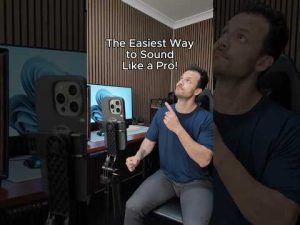Universal Music Group and TikTok music rights row heats up


Key takeaways
- Universal Music Group’s licensing agreement with TikTok expired on January 31.
- This led to heated disagreement, with Universal pulling their music from the platform.
- The soundtrack of some people’s content that features Universal tracks was muted as a result.
The recent standoff between TikTok and Universal Music Group over AI-generated music has ramped up friction between technology and copyright law.
The two behemoths remain at odds following the expiration of their licensing agreement on January 31.
UMG pulled its music from TikTok, leading the audio on many videos to be muted.
Universal Music Group (UMG) then publicly criticized TikTok for its over-saturation of AI-generated recordings on the platform.
In a strongly worded letter made public just a day before their agreement ended, UMG expressed concerns that TikTok’s demands could “massively dilute the royalty pool for human artists,” equating compliance with these terms to “nothing short of sponsoring artist replacement by AI.”
TikTok’s statement returned fire: “It is sad and disappointing that Universal Music Group has put their own greed above the interests of their artists and songwriters.”
“Despite Universal’s false narrative and rhetoric, the fact is they have chosen to walk away from the powerful support of a platform with well over a billion users that serves as a free promotional and discovery vehicle for their talent.”
This has led to a blanket ban on the use of music from Universal’s high-profile artists like The Beatles, Taylor Swift, and Bad Bunny on TikTok.
Creators aren’t happy about the row
When UMG abruptly pulled its music catalog from TikTok, it left thousands of creators on the platform in the lurch.
With their videos muted, many expressed outrage over UMG’s actions and their consequences.
Some of the most impacted are TikTok creators like dancer Lars Gummer and sample expert Jarred Jermaine, who have built followings by analyzing and choreographing hits from UMG artists.
Gummer – who said his LA-based dancer friends were “immediately angry” – had invested considerable time and money into producing dance videos now rendered soundless.
Meanwhile, Jermaine, whose niche is in explaining songwriting techniques, posted tearful videos claiming his life’s work was being erased.
Individual musicians also voiced frustration with UMG’s decision, which happened without their input.
Jack Antonoff, the Grammy-winning producer behind major stars like Taylor Swift and Lana Del Rey, sharply criticized UMG’s stance. “I think it’s ass-backward,” Antonoff told reporters after his Producer of the Year Grammy win, arguing artists “should have known” before UMG took such disruptive action.
While A-listers like Swift, Drake, and Bad Bunny haven’t chimed in so far, less prominent acts especially stand to suffer from diminished TikTok exposure.
Universal’s argument
UMG argues that TikTok relies heavily on music to drive user engagement yet does not adequately compensate artists and songwriters.
As UMG states:
“TikTok’s success as one of the world’s largest social platforms has been built in large part on the music created by our artists and songwriters. Its senior executives proudly state publicly that ‘music is at the heart of the TikTok experience’ and our analysis confirms that the majority of content on TikTok contains music, more than any other major social platform.”
However, UMG claims TikTok only accounts for 1% of their total revenue, indicating the very low licensing rates they pay:
“As an indication of how little TikTok compensates artists and songwriters, despite its massive and growing user base, rapidly rising advertising revenue and increasing reliance on music-based content, TikTok accounts for only about 1% of our total revenue.”
UMG argues this represents unfair treatment and underpayment of artists:
“Ultimately TikTok is trying to build a music-based business, without paying fair value for the music.”
When UMG tried negotiating for better rates, they claim TikTok resorted to intimidation tactics by removing music from developing artists while keeping major stars:
“TikTok attempted to bully us into accepting a deal worth less than the previous deal…By selectively removing the music of certain of our developing artists, while keeping on the platform our audience-driving global stars.”
Overall, UMG’s core argument is that TikTok relies on music yet refuses to adequately compensate the artists and songwriters who create that music.
They claim TikTok has resorted to strong-arm tactics rather than making fair licensing deals.
Copyright disputes intensify
This dispute is symbolic of an industry-wide debate over the role of AI in the creative industries.
Artists and content creators are raising alarms over potential infringement and the dilution of human creativity by AI.
Kristelia García, a Georgetown Law Professor, shed light on Universal’s stance, suggesting that the company aims to set a precedent regarding treating AI-generated content.
“Universal may want to set precedent on how platforms treat AI-generated content since it currently sees the technology as being bad for business,” García explained.
The dispute also discusses the potential economic implications for Universal and its artists.
If TikTok goes down the AI-generated music route, which it has in recent times, it could reduce reliance on Universal’s catalog, thereby impacting the financial returns for the label.
Peter Nicolas, a University of Washington School of Law professor, voiced concerns about the economic fallout, stating, “Because you’ve got all of this AI-generated stuff kind of filling up a lot of people’s time and space, it’s going to diminish the amount of money that these artists and songwriters get.”
In other words, if TikTok can pump AI music to their platform, no artists get paid.
It’s a tricky balance; many artists don’t feel aligned with their party. For example, Yungblud expressed frustration over the corporate tug-of-war, highlighting the absurdity of two massive companies dictating the fate of people’s art.
The dispute also raises legal questions about enforcement and copyright infringement, especially if users attempt to circumvent the ban by creating similar versions of Universal’s music.
Post Views: 137








